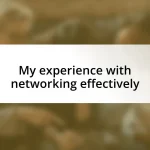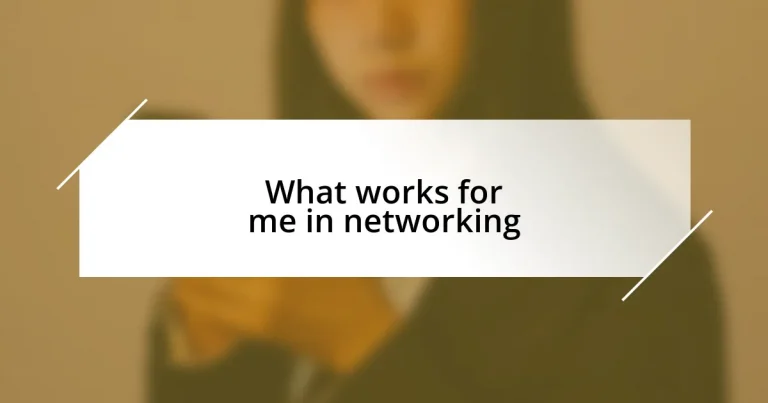Key takeaways:
- Networking is about building genuine relationships based on trust and reciprocity, emphasizing active listening and non-verbal communication.
- Identifying clear networking goals helps focus efforts and target relevant individuals and events for more effective connections.
- Building a personal brand through authenticity, consistency, and transparency enhances networking opportunities and fosters deeper connections.
- Leveraging social media can expand networking horizons, allowing for meaningful interactions and engagement with industry professionals and influencers.
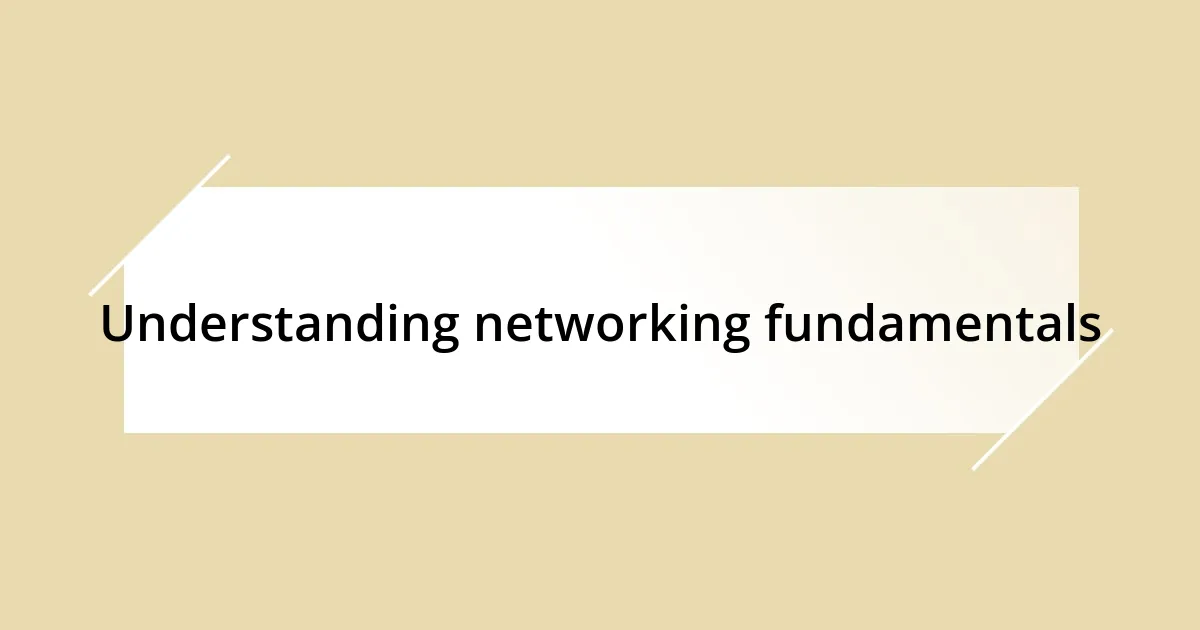
Understanding networking fundamentals
When I first delved into networking, I realized it’s not just about exchanging business cards; it’s about building genuine relationships. I remember attending a local meet-up where I spoke with someone who had a wealth of experience in my field. That casual conversation turned into a mentor-mentee relationship that has greatly enriched my professional life. This experience taught me the importance of making meaningful connections rather than simply trying to expand my contact list.
Networking fundamentally revolves around trust and reciprocity. It’s a give-and-take relationship, and I’ve found that listening actively often has more impact than talking about myself. Have you ever been in a situation where you felt someone truly valued your input? I strive to create that atmosphere when I network, which not only strengthens my relationships but also encourages others to open up.
Understanding the nuances of networking also means being aware of body language and non-verbal cues. I recall a networking event where I focused on my body language and found myself engaging more effectively. It made me wonder: how often do we underestimate the power of a smile or a firm handshake? Creating a welcoming and approachable presence can truly unlock opportunities and connections that might otherwise go unnoticed.
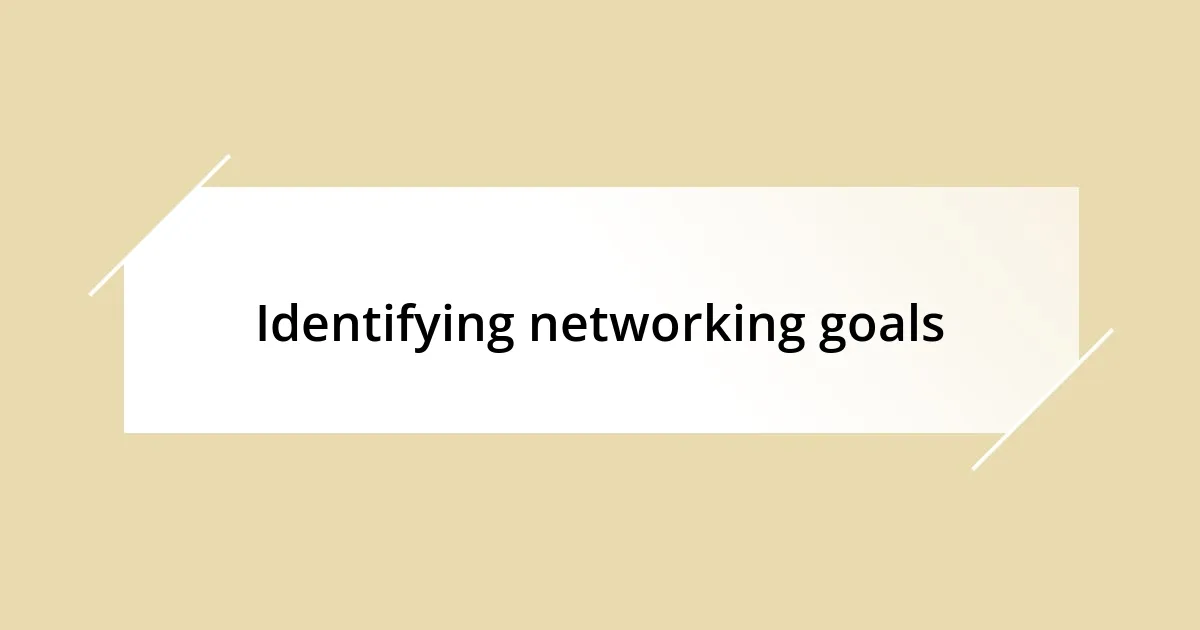
Identifying networking goals
Identifying your networking goals is a crucial first step in this journey. Reflecting on your aspirations helps guide your interactions and keeps your efforts focused. For instance, during a particularly rewarding phase of my career, I aimed to connect with industry leaders to gain insights and opportunities. This clear goal enabled me to target specific events and individuals, making my networking efforts more effective and much less scattered.
Here are some questions to help you pinpoint your networking objectives:
- What do I hope to achieve through networking? (e.g., mentorship, job opportunities, collaborations)
- Who are the key individuals or groups I want to connect with?
- How can I leverage my existing network to reach these goals?
- What skills or knowledge do I want to gain from these connections?
- Am I open to sharing my own insights and experiences to foster mutual growth?
By asking yourself these questions, you’ll start crafting a networking strategy that resonates with your personal and professional aspirations.
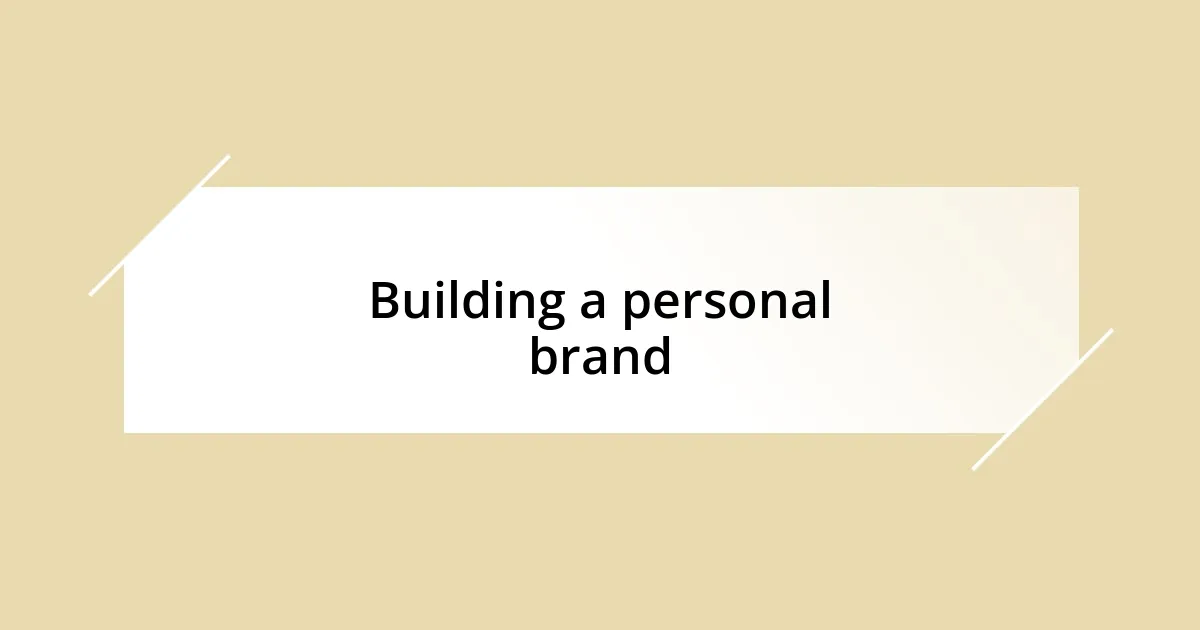
Building a personal brand
Building a personal brand is one of the most impactful ways to enhance your networking efforts. I’ve come to understand that my personal brand is an extension of who I am and what I stand for. For instance, when I started sharing my experiences and insights on social media, I noticed how it attracted like-minded individuals to my circle. It was fulfilling to see how authentic self-expression resonated with others, helping me forge connections based on common values.
Additionally, I believe that consistency is key when it comes to personal branding. Early on, I struggled with presenting myself in various settings. It took time to realize that whether I’m at a formal event or a casual gathering, my core values should shine through. This consistency has not only established trust but also made me memorable. Can you think of a time when someone’s strong personal brand left a lasting impression on you? I certainly have—those moments inspire me to keep refining my own.
Ultimately, building a personal brand is about more than just self-promotion; it’s about creating a narrative that others want to be part of. When I transitioned into a leadership role, I emphasized transparency and vulnerability. Sharing my challenges and successes opened up dialogues that deepened relationships. Have you ever felt empowered by someone’s honesty in their journey? I find that embracing vulnerability in my branding invites collaboration and creates a supportive networking environment.
| Personal Branding Element | Description |
|---|---|
| Authenticity | Being true to yourself and expressing your values. |
| Consistency | Maintaining the same message and image across various platforms and interactions. |
| Transparency | Being open about your experiences, both good and bad. |
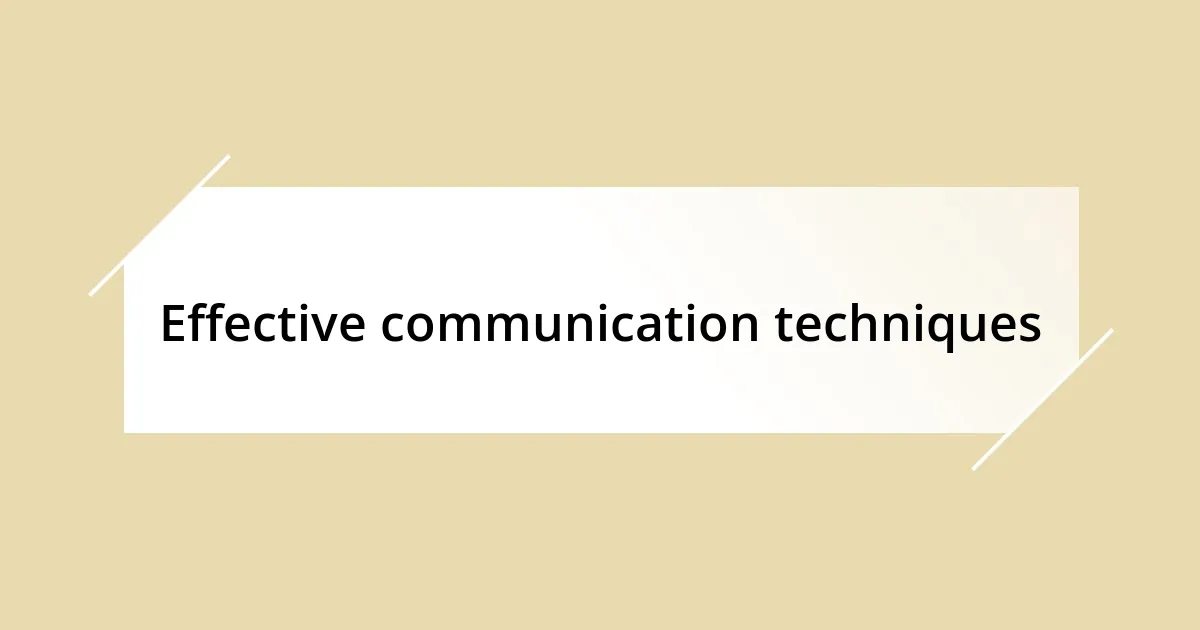
Effective communication techniques
Effective communication techniques are vital in making lasting connections. One approach I’ve found particularly helpful is active listening. When I engage with someone, I focus intently on what they’re saying, asking follow-up questions that show I’m genuinely interested. This practice not only fosters trust but also opens doors to deeper conversations. Have you ever noticed how rare it is for someone to truly listen? When I’m on the receiving end of attentive listening, I always feel valued and appreciated, which encourages me to reciprocate.
Another technique I’ve honed is the art of storytelling. I’ve learned that sharing a relevant experience can make a message resonate more powerfully. For example, during a recent networking event, instead of just listing my professional achievements, I shared a challenging project that taught me resilience and teamwork. This approach sparked conversations with others who related to my journey, forming a connection that was far richer than typical small talk. Isn’t it fascinating how a simple story can bridge gaps between strangers?
Lastly, nonverbal communication plays an often-overlooked role in networking. I’ve noticed how my body language can either invite engagement or create walls. Simple gestures—like maintaining eye contact and offering a warm smile—can make others feel welcome and encourage them to share more openly. During one inspiring conversation, I realized that my posture and expression created an inviting atmosphere, prompting the speaker to open up about their aspirations. Have you ever felt the shift in a conversation simply due to someone’s demeanor? It’s enlightening how these subtle cues can shape our interactions.
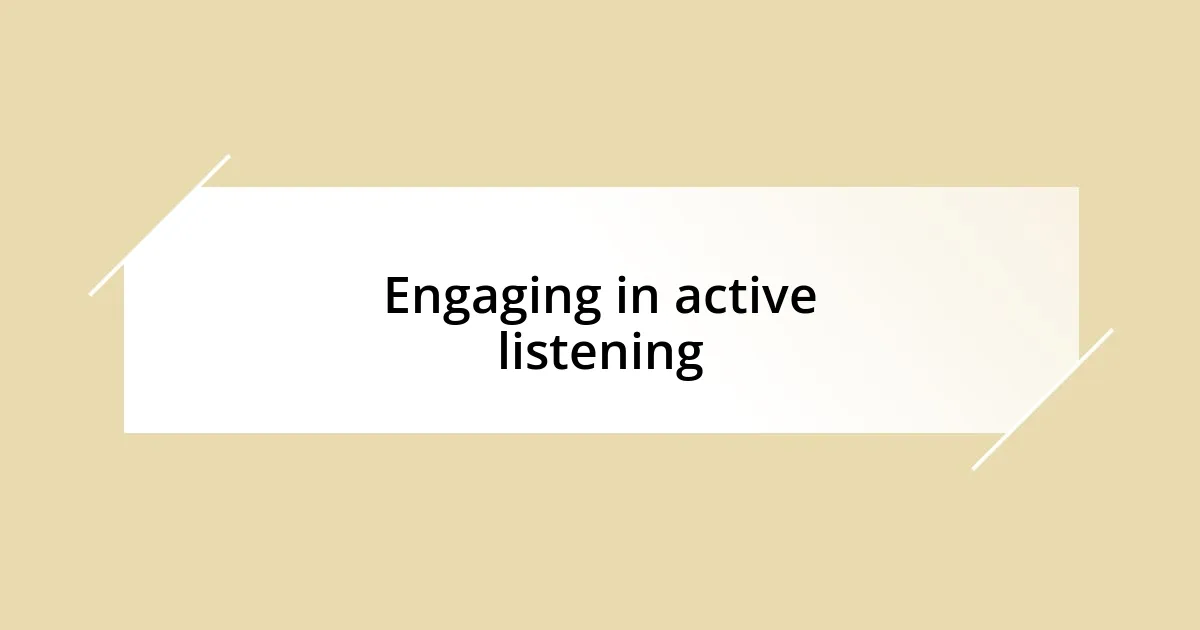
Engaging in active listening
Engaging in active listening can truly transform a networking experience. I remember attending a conference where I met someone whose passion for their work lit up the conversation. I made sure to focus entirely on what they were saying, nodding along and making eye contact. Their enthusiasm was contagious, and by simply reflecting on their thoughts, I could see their excitement grow. Doesn’t it feel great when someone genuinely acknowledges your words?
One particular moment stands out—while discussing our careers, I noticed my conversation partner hesitated to share a personal challenge. Instead of jumping in with my own story, I asked empathetically, “What was the most difficult part for you?” The look of relief on their face was instant. They opened up, sharing a pivotal moment that shaped their professional journey. It was a reminder that, sometimes, people just need a little encouragement to share their truth. Have you experienced how powerful it can be when someone feels safe enough to open up?
Active listening isn’t just about hearing words; it’s about understanding emotions and intentions. I’ve learned to pay attention not just to what is said, but how it’s conveyed. For instance, I once conversed with someone who spoke of their job in a monotone voice. I sensed their frustration and asked, “What’s been challenging lately?” The shift from a flat exchange to a heartfelt discussion was incredible. It highlighted that even subtle cues can reveal the deeper layers of someone’s experience. How often do we miss these signals in our rush to speak?
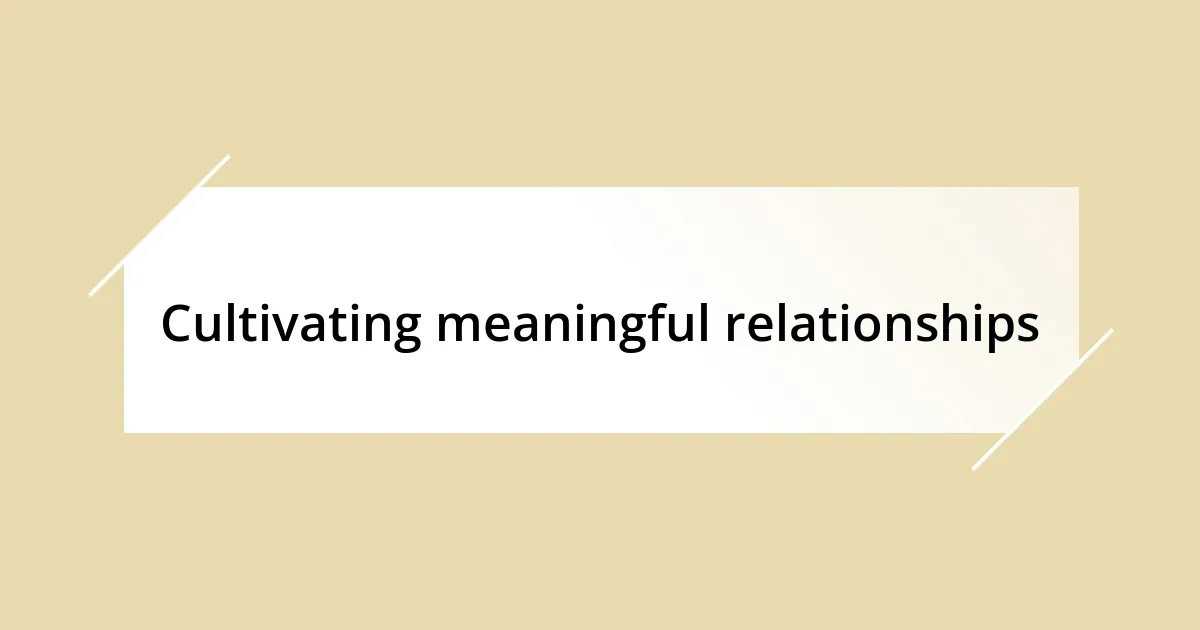
Cultivating meaningful relationships
Cultivating meaningful relationships begins with a genuine investment in others. I recall a time at a networking dinner when I sat next to someone who was initially reluctant to engage. Instead of diving into my accomplishments, I asked about their journey into their current role, and as they spoke, I could see their demeanor brighten. Isn’t it incredible how simply showing curiosity can transform a conversation?
One unforgettable encounter happened at a local meetup. I found myself sharing a project I was really passionate about. Instead of just detailing the facts, I painted a vivid picture of the obstacles I faced. Soon, others joined in, sharing their experiences. It felt more like a shared discussion than mere networking, and we quickly exchanged contact details. How often do we limit ourselves to transactional exchanges when there’s so much depth waiting to be uncovered?
Trust is built over time, and I’ve discovered the importance of follow-up. After a great conversation, I make it a point to send a quick note referencing our discussion. This simple gesture communicates that I value our connection beyond that fleeting moment. Once, I followed up with an individual I met at an event, and they expressed how rare it was to receive such acknowledgment. Have you ever thought about the lasting impact of a small act of kindness? It reinforces the bond we’ve started to build and lays the foundation for ongoing relationships.
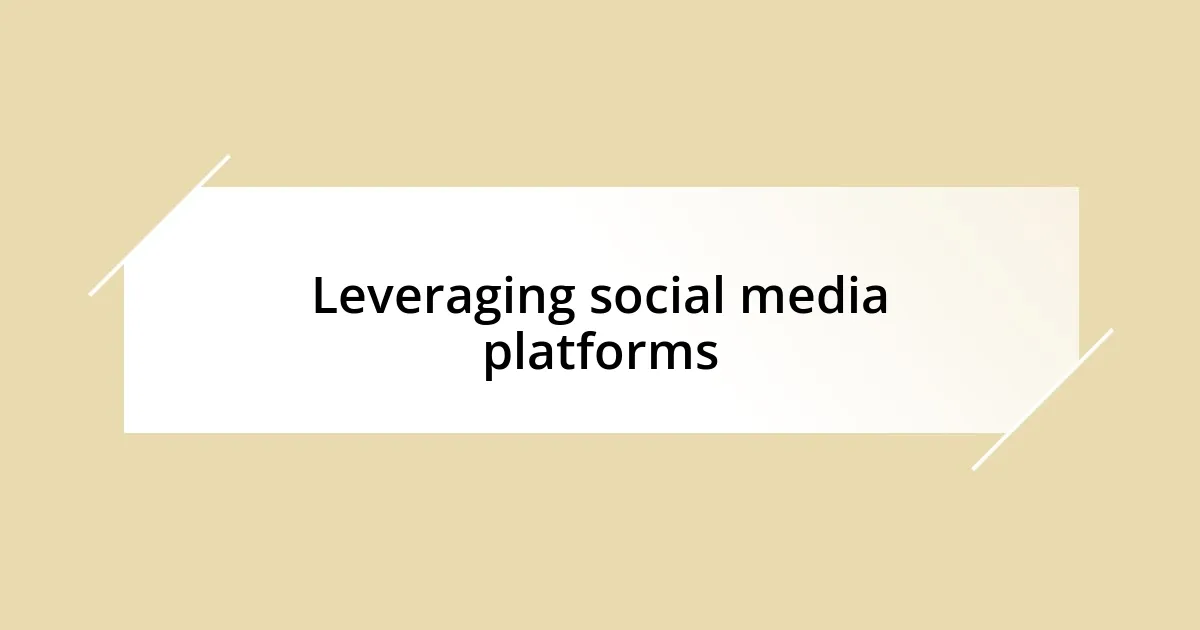
Leveraging social media platforms
Leveraging social media platforms
When it comes to networking, social media is an incredible tool that I have leveraged to build connections that extend far beyond the screen. I remember starting my LinkedIn journey, hesitantly reaching out to professionals I admired. I crafted personalized messages, reflecting on their work. Surprisingly, many responded positively—don’t you just love the feeling of a shared interest sparking a new conversation?
One time, I decided to participate actively in discussions on industry-related posts. I shared insights and asked questions, which led to meaningful exchanges. I found that my contributions opened doors I never expected. It was like stepping into a vibrant community where ideas flow freely—have you ever experienced a moment where your thoughts resonated with others online?
Additionally, embracing platforms like Twitter has given me the chance to connect directly with influencers and thought leaders. I recall attending a virtual panel discussion and tweeting my thoughts in real-time. To my astonishment, the speakers responded to my comments! Those fleeting interactions reminded me that social media is not just for broadcasting; it’s about engaging authentically. Have you ever thought about how a single tweet can create a ripple effect in your networking journey?











